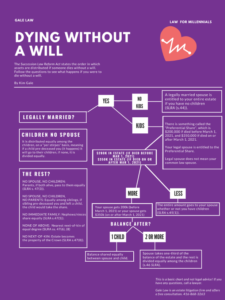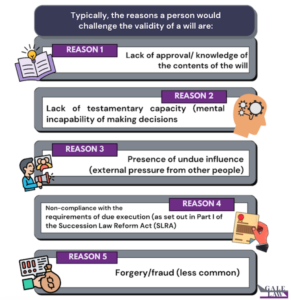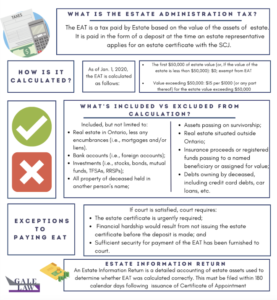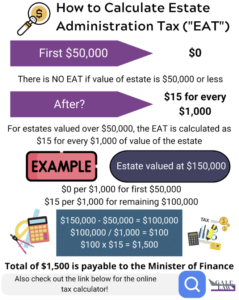All About Wills
A will is written document outlining the testator's (will writer) dying wishes. It often includes:
- Who to act as the administrator of their estate after they die (the estate trustee)
- Who they would like receive their estate after they die (their beneficiary)
- How debts are to be paid and any explanation as to why a loved one may be excluded from their will or a reason the estate is not divided equally, if needed
Wills provide a person the opportunity to dictate who should be in receipt of their money/property (estate) after they die and who should administer their estate.
It is worth noting while you can leave instructions as to how you wish to buried/cremated, the estate trustee has discretion and no legal obligation to follow these wishes. It is important to pick an estate trustee you trust.
Without a will, a deceased’s estate will be administered (given out) based on the Rules of Intestacy (which is a hierarchal chart of who automatically receives money/property from the estate).
While the Rules of Intestacy provide a route for administering (giving out the estate) for those who die without a will, it might not always be reflective of your personal life circumstances. For example, based off the rules of intestacy, a common-law spouse will not automatically receive anything from their deceased’s partners estate.
It is important to have a will for tax planning purposes as there may be legal ways your assets may be held which allow you to avoid paying additional taxes. A will is a good tool for estate planning.
When an individual passes away without a will, they die “intestate”. The “rules of intestacy” are written laws (statutory provisions) that describe who receive (inherits) the deceased’s estate (their possessions: this may be property, money, etc.) when there is no will.
Why are the “rules of intestacy” important? They essentially provide a “will written by the law” for those who die without a will or for those who have a will but it does not specify who gets what (the distribution) of their estate, also called “partial intestacy”.
The following flow-chart exemplifies how the rules of intestacy are outlined in the Succession Law Reform Act.

Unfortunately, not everyone had the chance to write a will. When this occurs, the “rules of intestacy” are written laws (statutory provisions) that describe who receive (inherits) the deceased’s estate (their possessions: this may be property, money, etc.) when there is no will.
As there is no will to appoint an executor, also called the “estate trustee” to administer the estate, there is a process to formally appoint this person. An estate trustee is a person who has the legal power and authority to give out (distribute/administer) or manage the estate.
The process to appoint the estate trustee is called “probate” or applying to the court for a “Certificate of Appointment of Estate Trustee Without a Will". The probate process is a legal procedure which asks the court to give a person the authority (appoint them) as the “estate trustee” of the deceased’s estate.
The role of the Estate Trustee is to administer (give out) the estate and to:
- Attend to funeral arrangements
- Protect estate assets
- Pay creditors, satisfy liabilities (such as taxes)
- Distribute (give out) specific bequests and residue of the estate
As there is no will, the estate trustee must follow the “rules of intestacy” in their distribution (giving out) the residue (what is left) of the estate.
Who Can Apply to Be an Estate Trustee When There is No Will?
The deceased’s partner (married or common-law) has the right to apply for probate. If that does not apply, another closely related adult relative (child, sibling, parents, etc.) may apply. Otherwise, the courts have the right to appoint (determine) a relative who the courts views as the appropriate.
Applying for Probate
There are two types of probate applications:
- If the value of the estate is between $0-$150,000, then you are applying for a Small Estate Certificate.
- If the value of the estate is more than $150,000, then you apply for a Certificate of Appointment of Estate Trustee Without a Will.
Probate may not always be required. For example, if all of the deceased’s assets (what they owned) were held jointly (For example, check the deed /“title” to your home: who is as the owner? If the owner is the deceased and another person as “joint tenants", then the house passes outside of the estate to that other person, the living person through the “right of survivorship”).
If the deceased’s estate includes assets (things they own) that are held in their name alone, for example, then probate may be required to give out (administer) this asset.
Overview of the Probate Process
 |
Court FormsIt will be required that you provide and/or complete various forms such as court forms and provide the original will (if there is one) and death certificate. |
 |
The value of the estate’s assets is identifiedWhile filling out the application forms, you will be required to identify the value of any real property (e.g., homes, land) and the value of the deceased’s personal property (furniture, jewelry, artwork, beneficiary bank accounts etc.) You should be aware that there is an Estate Administration Tax that will be calculated based on the total value of the deceased’s estate when a certificate is applied for and issued. The Estate Administration Tax is due to be paid when the probate application is filed. |
 |
Serve (deliver) Documents to All Required PersonsBefore submitting all necessary forms to the court, you must serve (deliver) a copy of the application to any individual entitled (a beneficiary) to the estate (unless seeking a deferral). In the case of no will, these individuals can be identified based on the rules of intestacy . The applicant will also be required to receive the consent of the majority of beneficiaries (those entitled to inherit from the estate) to be named as estate trustee as there is no will. |
 |
Submit All Required Documents to the CourtAll required paperwork must be submitted in the county/district that the deceased lived (resided) in when they passed away. When submitting the application to the court, you must pay the Estate Administration Tax as a cheque payable to the Minister of Finance. |
 |
BondWhat is a bond? A bond is a legal agreement by the estate trustee that ensures they take responsibility for their duties in line with the law. If the estate trustee fails to do so, they are obligated to pay an agreed sum of money. The bond acts as protection in case of financial (money) loss due to an estate trustee’s dishonest actions or mistakes. Bond is usually equal to double the value of the estate. Your lawyer may assist you in seeking to waive the bond. |
Sometimes even with a will, “probate” is required for the estate trustee (named in the will or seeking to be appointed) to give out (distribute/administer) certain assets (for example, real property such as a house or condo, bank accounts held in the name of the deceased, etc).
The estate trustee may also wish to “probate” the will which allows them to prove the will and register the will in court.
The probate process is a legal procedure which asks the court to give a person the authority (appoint them) as the “estate trustee” of the deceased’s estate.
The role of the Estate Trustee is to administer (give out) the estate and to:
- Attend to funeral arrangements
- Prove the will
- Protect estate assets
- Pay creditors, satisfy liabilities (such as taxes)
- Distribute (give out) specific bequests and residue (what is left) of the estate
As there is a will, the estate trustee must follow the terms of the will in their distribution (giving out) specific bequests and residue (what is left) of the estate
In the case when there is a will, the will typically includes the name of the individual that the deceased wants the estate trustee to be. This named individual usually applies to start the probate process.
When there is a will, the probate process essentially approves the will as valid (meaning legitimate) and grants the named person as the estate trustee.
What happens if the named person is unable to act as the estate trustee? Then the deceased’s estate will be interpreted as having no named estate trustee and a family member or corporate trustee (institutions such as a bank) can apply to be appointed as estate trustee.
Applying for Probate
There are two types of probate applications:
- If the value of the estate is between $0-$150,000, then you are applying for a Small Estate Certificate.
- If the value of the estate is more than $150,000, then you apply for a Certificate of Appointment of Estate Trustee.
Probate may not always be required. For example, if all of the deceased’s assets (what they owned) were held jointly.
For instance, check the deed/“title” to your home: who is as the owner? If the owner is the deceased and another person as “joint tenants, then the house passes outside of the estate to that other person, the living person through the “right of survivorship”).
If the deceased’s estate includes assets (things they own) that are held in their name alone, for example, then probate may be required to give out (administer) this asset.
Overview of the Probate Process
 |
Court FormsIt will be required that you provide and/or complete various forms such as:
|
 |
The value of the estate’s assets is identifiedWhile filling out the application forms, you will be required to identify the value of any real property (e.g., homes, land) and the value of the deceased’s personal property (furniture, jewelry, artwork, beneficiary bank accounts etc.) You should be aware that there is an Estate Administration Tax that will be calculated based on the total value of the deceased’s estate when a certificate is applied for and issued. The Estate Administration Tax is due to be paid when the probate application is filed. |
 |
Serve (deliver) Documents to All Required PersonsBefore submitting all necessary forms to the court, you must serve (deliver) a copy of the application to any individual entitled (owed) a piece of the estate (unless seeking deferral). |
 |
Submit All Required Documents to the CourtAll required paperwork must be submitted in the county/district that the deceased live in when they passed away. When submitting the application to the court, you must pay the Estate Administration Tax as a cheque payable to the Minister of Finance. |
 |
BondWhat is a bond? A bond is a legal agreement by the estate trustee that ensures they take responsibility for their duties in line with the law. If the estate trustee fails to do so, they are obligated to pay an agreed sum of money. The bond acts as protection in case of financial (money) loss due to an estate trustee’s dishonest actions or mistakes. Bond is usually equal to double the value of the estate. Your lawyer may assist you in seeking to waive the bond. |
Will Challenge and Interpretation
A will challenge is where someone disputes (disagrees with) the validity (legal acceptability) of the Last Will and Testament of
a deceased.
A testator (person who wrote the will) must have had legal capacity to execute a will, not have been unduly influenced, and have had knowledge and approval of the contents of the will. The will must be signed and executed properly for the will to
be valid.

It is up to the person propounding the will (the person alleging the will is valid) to establish, on a balance of probabilities, that the deceased had testamentary capacity (meaning mental ability, which is a legal test) when the will was executed (written). However, if undue influence (external pressure from others) is being alleged, it is up to the person alleging undue influence to prove its existence.
Interpreting Wills
The governing idea driving will interpretation (how we understand what is written) is that the “plain meaning of the will’s language” will be prioritized. This means the will be interpreted exactly as it is written.
If the will leaves ambiguity (uncertainty) in its terms, courts will use an “armchair” approach at interpreting. The “armchair” approach means that a judge must place themselves into the shoes of the testator (will writer) when the will was made, and consider all factors and circumstances the deceased would have considered when writing the will.
The process to legally challenge a will requires the following steps:
 |
Speak with a LawyerAn estate litigation lawyer can help you understand the process, review the strength of your case, explain the legal costs and answer any of your questions. At Gale Law, we practice exclusively estate litigation and have regularly acted for clients seeking to challenge or uphold wills.
|
 |
File a notice of objection or return of Certificate of Appointment of Estate TrusteeA Notice of Objection will require the challenger to describe the reasons they consider the will to be invalid (not legally acceptable) and their financial interest in the estate. This Notice, filed with the court registrar, will pause the appointment of an estate trustee if not yet probated (not legally granted yet and no Certificate was issued). If the estate trustee has already been appointed (the will was probated and a Certificate was issued) then you may need to motion (legal request) to have the Certificate of Appointment of Estate Trustee be returned to the court. |
 |
Provide EvidenceThis will require you to show evidence for the reasons you are challenging the validity of the will. For instance, if you are claiming that the testator lacked testamentary capacity, you might require medical records and a retroactive capacity assessment. |
 |
Judge Looks at EvidenceThe judge will look at all evidence presented to determine the validity of the will. If this matter is brought in Toronto, Windsor, or Ottawa then the parties must attend mediation (an attempt to settle the matter out of court; mediation is mandatory per Rule 24.1 ) before a final hearing of the matter. Kim Gale has a Masters of Law in Dispute Resolution and is a mediator for estate disputes. |
Requirements to making a Valid Will
Handwritten wills (aka a “Holograph” will) If handwritten in your own writing, then only a SIGNATURE and DATE is required. A witness will not be required.
Typed-Wills: For a typed-up will to be considered valid, it must be:
- Signed by the testator (person writing the will)
- Witnessed by two people, who are;
a. Not a beneficiary or partner of a beneficiary and;
b. Were present when the testator signed the will
It is important that a beneficiary or legal spouse should not act as a witness. If they do, the gift to that beneficiary fails, unless a judge orders otherwise.
Additionally, typed-up wills require an affidavit of execution (written document signed by a witness legally promising that they witnessed the testator signing their will) when being probated (legal process approving distribution of estate).
Can I Make a Change to My Will?
Yes. These are called “codicils” and can be added to existing wills. To ensure the validity of a codicil, the same principles of making a will should be followed.
If you wish to make major changes to your will, it may make sense to fully write a new will. It is never recommended to alter your will by adding handwriting by scratching/crossing off or adding writing. It will not meet legal standards to be considered valid.
When making a new will, it is recommended revoke (cancel) your previous will. This can be achieved by specifically stating in the new will that the prior will is no longer valid. It is important to make sure that when canceling a prior will, that your new will mentions any prior terms (wishes) you had and still want to keep.
Important times to consider a will change is when an individual gets married, divorced, or separated. Getting married will no longer invalidate (cancel) a prior will as of January 1, 2022. Similarly, getting divorced or separated will not cancel a prior will.
Where to Keep Your Will
Your original will is required for the probate process. You want to make sure you keep your will in a place that is accessible when needed but safe from damage. There are a few options where you can safely keep your original will:
- Deposit it at Court: the court system will keep your original will safe for a fee
- Store it with your lawyer: this option while safe, will require you to make an effort to inform those you would want to see the will onceyou pass with what lawyer it is being held with
- You keep it: it is recommended if you keep it that you either store it in a personal fire-proof safe or utilize a safety deposit box at a bank
A destroyed will by the testator is considered to be revoked (cancelled) and is not valid. It is notable that you should only have one original will, therefore it is important to keep your original will in a safe place. You may keep copies in addition to the original will as well, but it is the one original will that will be needed on your death.


